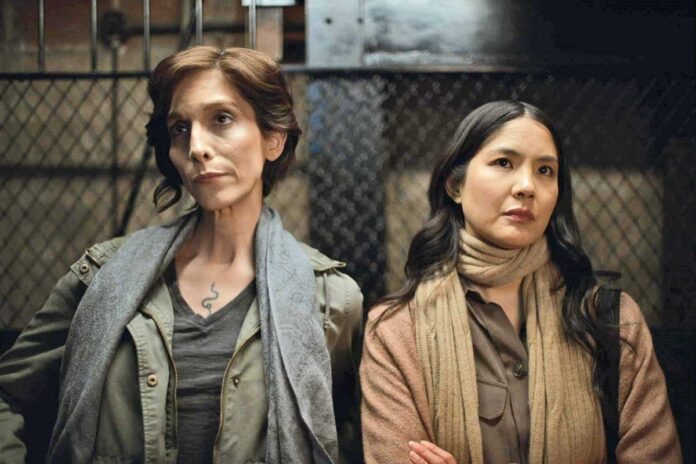“See You Then” is a wistful, compelling two-hander, available April 19 on DVD and digital, about Naomi (Lynn Chen) and Kris (Pooya Mohseni) reuniting after more than a decade apart.
When Naomi first sees Kris, she tells her, “You look different” — and she does; Kris has transitioned to female in the years since she abruptly walked out on Naomi, her ex-lover. The women agree they have “a lot to talk about,” and trans director/cowriter Mari Walker stages the film as an extended conversation.
The dialogue is carefully chosen. Over a meal, the two characters are initially apprehensive as they engage in small talk, but they soon fall into an old, familiar rhythm before addressing the elephant in the room — that Kris not only left Naomi without an explanation, but also that Naomi heard from someone else about Kris’ transition. Kris makes a sincere apology, but Naomi harbors some resentment. Tensions simmer between the two friends, and this friction makes “See You Then” involving.
As the evening progresses, Naomi tries to make an excuse to end their reunion early, but Kris encourages her to go for a drink. On their way to a bar, Naomi gives a monologue about her wild performance art projects to illustrate that she was once daring, but now lives a more boring life.
“See You Then” is most interesting in how these two friends measure themselves against the other, constantly one-upping each other even as they are being supportive. And this dynamic kind of chafes. When Kris confesses to having been with only one other lover since transitioning, Naomi tries to play matchmaker, which Kris resists. When Naomi talks about her two children, Kris bemoans the very real fact that she cannot have kids. Their exchanges seesaw back and forth with talk of disappointments and might-have-beens.
The actresses are very measured in their performances and one of the intriguing aspects of the film is observing how genuine these women are in what they express. Kris has a lengthy speech about motherhood that is poignant — but is it a knee-jerk reaction to seeing Naomi divert their evening to care for her kids? And while Naomi is restless, and down on her job, her husband, and her own art, she seems to admire Kris’ “reinvention,” which Kris claims was “survival.”
“See You Then” treads most carefully when it comes to discussions of gender. There is talk about male privilege that bonds the two women, but Naomi is curious if Kris has had relationships with women since transitioning, and she asks Kris point blank if it is harder for her to be trans or female. These are, perhaps, inappropriate questions, and Kris may just be politely letting things roll, hoping not to offend her friend. It would be less awkward if Kris divulged this information unprompted.
And while Kris talks about how she is able to pass in society, the film skirts the bathroom issue when she mentions the need to pee. At times, the film feels slight, as if Walker is touching on topics— from the perils of online dating to sexual assault — as if to shoehorn as many issues as possible into 74 minutes.
But “See You Then” eventually builds to its climax and a long-held secret that challenges and changes the relationship between these reconnected exes. It is a nice, meaty sequence, set in an art space where Naomi teaches (which also makes it visually interesting.) What transpires may not be completely surprising given the discussions leading up to this revealing moment, and it does allow the actresses to emote with some relish — and say some rather hurtful things.
As Kris, Pooya Mohseni gives a delicate, mostly reserved performance, until the final confrontation. She is best when she reacts silently to Noami removing her hand when Kris touches her, or when she looks around Naomi’s house and gets a real glimpse of her friend’s life. Mohseni maintains Kris’ dignity, which is why viewers will empathize with her.
As Naomi, Lynn Chen has the showier role, but she never comes across as overbearing. (That job is saved for Danny Jacobs, who plays an obsequious colleague of Naomi’s, who turns up in a bar and makes a pass as Kris.) Chen plays Naomi as a woman who processes her thoughts and feelings often by articulating them — and she lobs bombshells.
“See You Then” may feel stagey, unfolding as a series of episodes in a restaurant, on the street, in a bar, and elsewhere, but the minimalist approach allows viewers to focus on the characters, and their conversation without distraction. The film never wears out its welcome even as Kris and Naomi’s relationship goes from friendly to fiendly. It is watching these two exes reevaluate and recalibrate where they are in their lives that resonates. Walker’s elegiac film ends with a nice coda that shows how each woman has been changed by their encounter.
